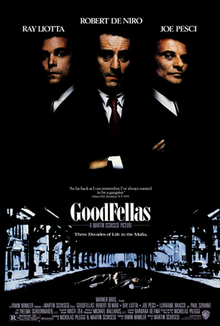I have no great love for the mobster films of Martin Scorsese, yet not having watched Goodfellas feels like an increasingly blatant hole in my cinematic education. It’s weird to see this now as so many of the shots from it are now memes in popular culture and the character archetypes Scorsese establishes here recurs so often in later films. There is no absolutely doubt that Scorsese is at the height of his powers here as he brings so much rich detail and life to the stories of the gangsters. Yet it’s also pure glorification of a lifestyle that revolves entirely around being unrepentant murderers and robbers. Sure they get their comeuppance at the end as is traditional but you can tell that Scorsese has no enthusiasm for that part of the film at all.
Henry Hill grows up in a working class neighborhood envying the lifestyle and status of the mobsters and soon gets a job with them before he even completes high school. He starts out being a parking valet for the local boss Paulie Cicero and soon graduates to more serious crimes like fencing stolen goods, hijacking trucks and chasing after debtors. He becomes close with two other violent criminals Jimmy Conway and Tommy DeVito. A double date with DeVito results in Henry being introduced to Karen Friedman, a Jew. Despite a disastrous first date, he seems impressed by Karen’s fiery personality and she in turn is seduced by his apparent wealth and how everyone gives him the VIP treatment. They get married and Karen is introduced to the wider Mafia family but Henry continues to see other women on the side. By 1970, Henry owns a nightclub of his own. A member of the Gambino crime family, Billy Batts, is visiting the club when he makes a derogatory comment that Tommy perceives as an insult. Tommy promptly beats him up and kills him with the help of Jimmy and Henry. This incident would cause them problems later as Billy was a made man. Henry is later imprisoned after collecting a debt from a gambler. Bereft of income while in prison and abandoned by his friends, he turns to dealing drugs.
This film starts out amazingly strong being solidly grounded in the Brooklyn neighborhood Henry grows up in and featuring the colorful people who inhabit that milieu. Henry makes for a more likable character when his crimes don’t seem that murderous and he comes across as more of an industrious hustler. The long tracking shot of him and Karen entering the Copacabana club perfectly exemplifies the glamor of the mobster lifestyle at its peak. Humorous details such as how everyone in the Mafia families all seem to share the same names or Karen’s astute observations that the women are mostly nouveau riche who don’t know how to wear their makeup properly and have awful tastes in fashion make this account feel authentic and entertaining. As Henry himself puts it, being a mobster means being somebody, you’re feared and respected, you get to live the high life and you don’t have to put up with anyone’s shit. This is exactly why the lives of mobsters can be so seductively fascinating and you can feel Scorsese’s own enthusiasm suffusing the scenes.
Yet the fact is that Henry and his friends are terrible people for whom we should have zero sympathy. They have no redeeming qualities whatsoever as even their friendships mean nothing in the end. Jimmy is more willing to kill his fellow participants in a lucrative heist than to share the spoils. For all the money that they make, they are unable to save a single cent and are immediately in financial trouble once the tap stops flowing. Sure, you might say that the characters have a bad ending in this film so it all works out in the end. But the ending is so perfunctory that you can tell that Scorsese’s heart isn’t in it at all. The fun part, the seductive and sexy part is when he is on the way up and living the high life. The film has no interest in showing these characters truly suffer from their choices in life. It doesn’t even want to show the details that make the characters look uncool. For example the real life version of Tommy apparently tried to rape Karen while Henry was in prison. At that time, Karen was having an affair with Paulie so Paulie ratted Tommy out to the Gambino family and they took revenge for his killing of Billy Batts. It’s unglamorous, it makes these characters look like stupid chumps and so of course it has no place in a film like this.
This is considered one of the very best mobster films and I can easily agree with that. But what if I don’t actually like the genre very much since the appeal is in glorifying that lifestyle? These films certainly don’t show the crimes from the perspective of the victims and the consequences they leave behind. I don’t think the lives of these gangsters are that fascinating or cool as in the end they’re just short-term thinkers out to make money fast and make themselves feel important. I much prefer the true crime films that came later and that use a societal perspective to place their actions in context. I can’t deny that this is an entertaining watch and seeing Henry rise is an exhilarating high. Scorsese’s craftsmanship is superb and I can see why he keeps going back to actors like Robert De Niro and Joe Pesci. Yet I find the artistic value in a film like this questionable and won’t ever consider it among my favorites.
